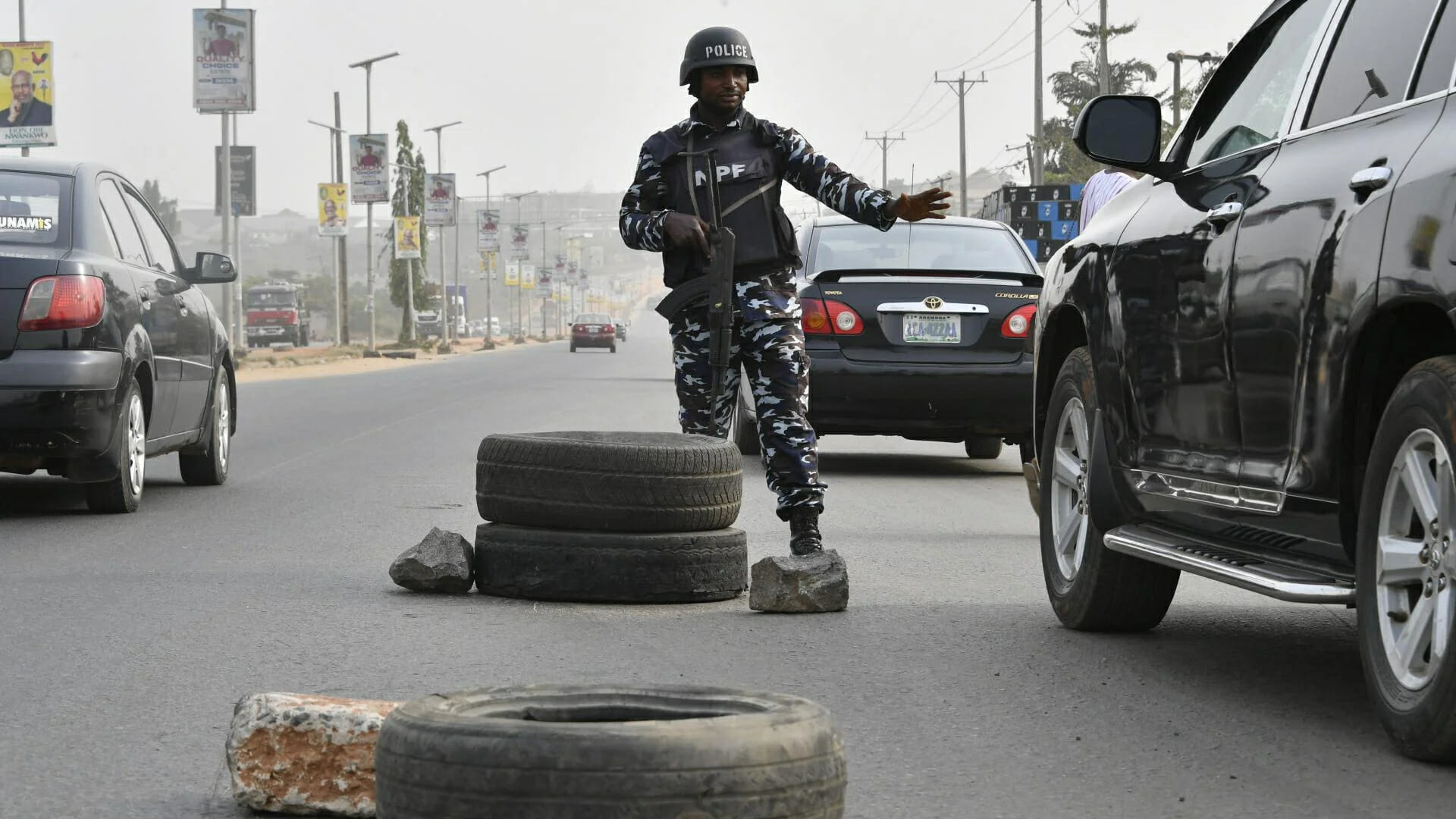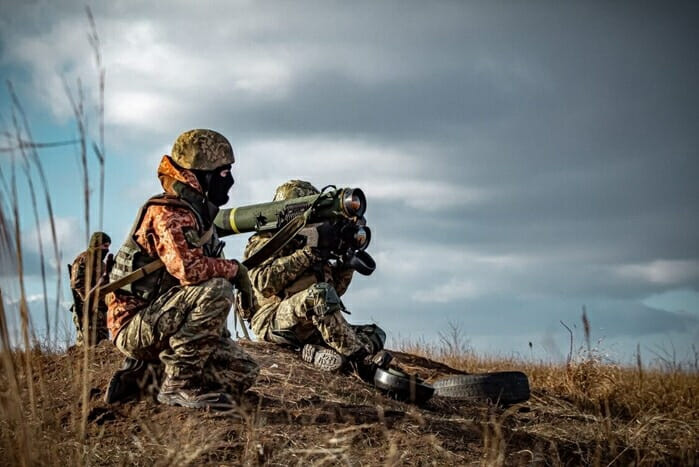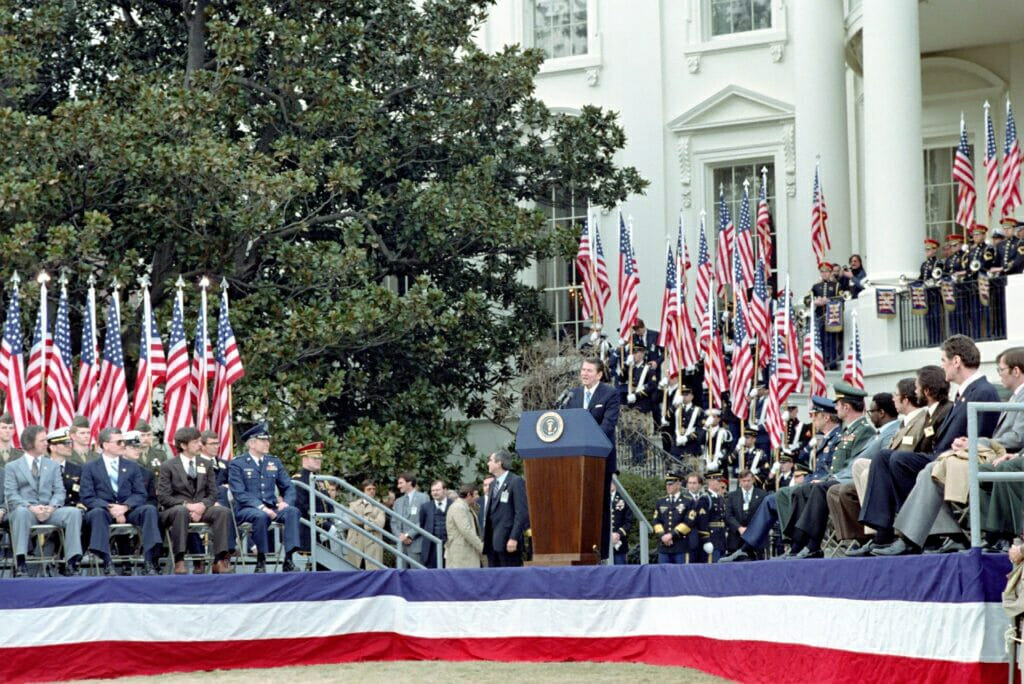By Type
By Topic
By Year
Press | Article
Clements Alum Nick Romanow offers commentary on “Leadership, Culture, and the Military Cyber Workforce” for War on the Rocks
Nicholas Romanow | Apr 11, 2024
“While a hypothetical future cyber force would surely assume this responsibility, the current health of the military cyber workforce remains a clear and present issue for the services to manage,” writes Romanow.
Clements alum Kyle Balzer writes why “America’s Leaders Don’t Understand Nuclear Weapons”
Kyle Blazer | Mar 12, 2024
In a new article for the National Review, former Postdoctoral Fellow Kyle Balzer explains why America’s nuclear rhetoric is insufficient for a new era of great-power competition. He references rhetoric used by Trump and Biden, as well as within American public discourse.
Asia Policy Program Director Published in Army War College Journal
Sheena Chestnut Greitens | Mar 07, 2024
In a new article for Parameters, the US Army War College Journal, Dr. Sheena Chestnut Greitens writes on “China’s Use of Nontraditional Strategic Landpower in Asia”. She argues that the People’s Republic of China uses its policy and internal security forces as a nontraditional means of projecting strategic Landpower in the Indo-Pacific and Central Asia….
Clements Alum Ayumi Teraoka co-authors piece in Pacific Affairs
Ayumi Teraoka and Ryo Sahashi | Feb 23, 2024
In “Japan’s Revolutionary Military Change: Explaining Why It Happened Under Kishida”, Ayumi Teraoka and Ryo Sahashi write about Japan’s rapidly changing security policy. The article evaluates why recent changes occurred under PM Kishida Fumio and what policy implications might exist.
Former Military Fellow Mike Knickerbocker writes on asymmetric threats and unmanned systems for War on the Rocks
Mike Knickerbocker | Jan 03, 2024
In his article, “Written in Black and Red: Asymmetric Threats and Affordable Unmanned Surface Vessels”, Knickerbocker compares the use of unmanned systems in the Red and Black Seas, analyzes the cost and benefit of these systems, and offers projections for the future.
Clements Alum Michael Knickerbocker writes article on U.S. submarine force in “1945”
Michael Knickerbocker | Oct 11, 2023
In “An Old Idea Ready to Resurface: The U.S. Needs A Logistics Element To Its Submarine Force”, Clements Alum Michael Knickerbocker examines the current state of and future possibilities for the U.S. submarine force.
Graduate Fellow Ryan Ashley comments on the U.S.-Japanese-Philippine Trilateral in War on the Rocks
Ryan Ashley | Oct 19, 2023
In his article “The U.S.-Japanese-Philippine Trilateral is Off-Balance”, Ashley provides commentary on the state of the security trilateral, including concerns, progress, and opportunities for more cooperation. The article includes references to field research supported by Clements Center grant funding.
Clements Alum Theo Milonopoulos evaluates “Paralysis in the Pentagon” in Foreign Affairs
Oct 12, 2023
“These holdups would disrupt any government agency, but they are especially pernicious at the Pentagon. A growing reliance on acting officials erodes civilian control of the military, and delays in the confirmation process put the futures of uniformed officers at the mercy of partisan agendas” writes Milonopoulos.
Asia Policy Program Director Sheena Chestnut Greitens quoted in Politico in article on Xi Jinping’s “Global Community of Shared Future” proposal
Sheena Chestnut Greitens | Oct 20, 2023
“It contests democracy… not by arguing that this focus is misplaced, but that American conceptions of democracy are ‘fake.’ It’s a fascinating choice for a ruling party that is only about seven percent of China’s population, but one that may get traction in places that have clashed with the United States or other Western powers…
ISP Director Stephen Slick quoted in Washington Post article on Hamas invasion on Israel
Stephen Slick | Oct 19, 2023
Slick noted that given the scale and variety of the Hamas attacks, “it is highly unlikely that the planning, training and positioning of this number of fighters would have escaped Israel’s collection systems. It’s more likely that relevant information was not processed or evaluated correctly or recognized as an indicator of hostilities.”
Graduate Fellow Sam Rosenberg co-authors new Foreign Affairs piece “Why America Should Send Military Advisers to Ukraine”
Sam Rosenberg | Sep 22, 2023
In this new article, graduate fellow Sam Rosenberg and Dr. Alexandra Chinchilla delve into why the U.S. should consider sending military advisers to Ukraine: “Advisers will, in other words, help bring about the war’s endgame: a free Ukraine integrated into the institutions at the foundation of Europe.”
Graduate Fellow Daniel Samet co-authors piece on U.S. foreign aid to Israel for Tablet
Daniel J. Samet | Aug 06, 2023
As part of Tablet’s ongoing series on the U.S.-Israel ‘special relationship’, Daniel J. Samet and Raphael Benlevi explain “The Pro-America Case for Ending Aid”. “Rather than being a zero-sum equation, it is in the best interests of both the U.S. and Israel to phase out aid gradually.”
Sheena Chestnut Greitens writes article for Foreign Affairs on Xi Jinping’s security obsession
Sheena Chestnut Greitens | Jul 28, 2023
“Since he came to power in 2012, the Chinese leader Xi Jinping has been laser-focused on ensuring the security of his regime.”
Graduate Fellow Sam Rosenberg co-authors article “Ukraine’s Other Allies: The West Should Assist the Private Actors Helping Arm Kyiv” for Foreign Affairs
Sam Rosenberg | Jul 25, 2023
Sam Rosenberg, Jahara Matisek and William Reno make a case for more informal assistance to Ukraine from the United States and its allies: “Over the past year, such informal assistance has come to play a crucial role in many aspects of the Ukrainian war effort and counteroffensive.”
Inboden Analyzes Secretary of State Blinken’s Recent Diplomatic Efforts in Beijing
William Inboden | Jun 22, 2023
“Diplomacy is much more than exchanging words. It is rather a complex choreography of many elements of national power, aimed to influence multiple audiences.” Read Will Inboden’s thoughts on Secretary of State Tony Blinken’s visit to Beijing earlier this week on World.
The Peacemaker Included in Arthur Ross Book Award 2023 Shortlist
William Inboden | Jun 06, 2023
Congratulations to our Executive Director Will Inboden! His book, The Peacemaker: Ronald Reagan, the Cold War, and the World on the Brink, has been included on the shortlist for the 2023 Council on Foreign Relations Arthur Ross Book Award! The annual Award recognizes books that make an outstanding contribution to the understanding of foreign policy…
Feaver and Inboden Look Back at the “…Fruits and Failings of the Freedom Agenda” in the Journal of Democracy
Peter Feaver, William Inboden | May 23, 2023
Will Inboden & Peter Feaver have a new piece in the Journal of Democracy “…considering what can be learned from the fruits and failings of the Freedom Agenda.”
WSJ Opinion Saturday Interview with Will Inboden Considers the Cold War’s Lessons for Today’s Republican Party
Kate Bachelder Odell, William Inboden | May 22, 2023
Be sure to read the Wall Street Journal Opinion Saturday Interview by Kate Bachelder Odell with our own Will Inboden: “The Reagan Lesson for the Trumpian Right on Ukraine and China.”
Sam Rosenberg Coauthors Two Articles on Military Assistance to Ukraine for RUSI
Sam Rosenberg | May 26, 2023
This last semester, Graduate Fellow Sam Rosenberg cowrote two articles for RUSI about military assistance to Ukraine. You can read them here: The Good, the Bad and the Ugly: Assessing a Year of Military Aid to Ukraine US-led Security Assistance to Ukraine is Working
Will Inboden Honors Henry Kissinger on His 100th Birthday
Will Inboden | May 27, 2023
Clements Center Executive Director pens “Kissinger at 100” commemorating the centenary of Henry Kissinger. “When anyone lives to celebrate a 100th birthday, it is notable. Living to a century while still commanding public attention, influencing policy, and writing bestselling books is another matter altogether. Such is the case with Henry Kissinger.” Kissinger serves as a member…
Feaver and Inboden Look Back at the “…Fruits and Failings of the Freedom Agenda” in the Journal of Democracy
Peter Feaver, William Inboden | May 23, 2023
Will Inboden & Peter Feaver have a new piece in the Journal of Democracy “…considering what can be learned from the fruits and failings of the Freedom Agenda.”
WSJ Opinion Saturday Interview with Will Inboden Considers the Cold War’s Lessons for Today’s Republican Party
Kate Bachelder Odell, William Inboden | May 22, 2023
Be sure to read the Wall Street Journal Opinion Saturday Interview by Kate Bachelder Odell with our own Will Inboden: “The Reagan Lesson for the Trumpian Right on Ukraine and China.”
Clements Center Alum James Barnett Authors Piece on Attack on US Convoy in Nigeria
James Barnett | May 18, 2023

James Barnett, research fellow at Hudson Institute and Clements Center alum, adds context to Tuesday’s attack on the US convoy in Nigeria “so that policymakers, analysts, and the media can understand how an attack like this could come about and avoid misinterpreting the incident.”
Zielinski and Gerstle Try to Understand Who is Better Positioned – the USA or China – to Finance Defense Spending
Rosella Cappella Zielinski, Sam Gerstle | May 17, 2023
How will the United States and China sustain the large defense budgets required for long-term competition? Rosella Cappella Zielinski, a former visiting professor at the Clements Center, and Sam Gerstle, an upcoming participant in our Summer Seminar in History and Statecraft, try to answer this question.
Davis Wins Andrew W. Marshall Prize on Creative Bursts & Intellectual Outliers
Emily A. Davis | May 15, 2023
Emily A. Davis was the grand prize winner of the Andrew W. Marshall prize on Creative Bursts & Intellectual Outliers, which asks people to examine how creativity among peer groups or within an organization comes about, is fostered, and is maintained. Many unanticipated dangers—military, political, technological, foreign, and domestic—shadow the U.S. national security landscape, creating…
Leung and Waltz Consider How 2024 Taiwanese Election Could Shape Crisis Management in East Asia
Zoe Leung, Cameron Waltz | May 07, 2023
Former Clements Center Undergraduate Fellow Cameron Waltz coauthored an opinion piece with Zoe Leung of the George H. W. Bush Foundation for U.S.-China Relations for The Hill on how the upcoming Taiwanese 2024 presidential election may shape crisis management in East Asia.
Pomar Underscores the Importance of International Broadcasting and Public Diplomacy as Russia Backslides on Free Media
Mark Pomar | May 03, 2023
“…public diplomacy and international broadcasting are fundamental to our national security.” Mark Pomar, a Clements Center Senior National Security Fellow, has a new piece in The Foreign Service Journal.
Fraser and Ashley Argue For Japanese/Korean Naval Cooperation in Southeast Asia
Ryan Ashley, Jada Fraser | Apr 28, 2023
“…Japan’s and South Korea’s interests and activities are meeting in strategic spaces in Southeast Asia…Despite sharing common goals in these spaces, so far Seoul and Tokyo have not collaborated in their efforts.” Clements Center alum Jada Fraser and current Grad Fellow Ryan Ashley recently published a new article in Asia Policy, “Common Waters: Japan, South…
Rosenberg, Matisek and Reno on the Outsize Effect of Informal Security Assistance on the War in Ukraine
Jahara Matisek, William Reno, Sam Rosenberg | Apr 17, 2023

“Debates about appropriate military equipment for Ukraine continue a year after Russia’s full-scale invasion of Ukraine. These arguments focus predominantly on state-to-state assistance. But they miss an important element of Kyiv’s battlefield performance: informal security assistance. Aid from domestic civil society, informal military networks, and foreign volunteers are bolstering the Armed Forces of Ukraine in real and meaningful ways.”
Brands, Feaver, and Inboden Publish New AEI Report on US Grand Strategy for Great-Power Competition
Hal Brands, Peter Feaver, William Inboden | Apr 11, 2023

“Prevailing in great-power rivalry is likely to be more difficult, expensive, dangerous, and all-consuming than US policymakers have so far been willing to admit—or than the American public presently understands.”
Romanow Piece in Proceedings Considers the Pros and Cons of “Declassification for Effect”
Nicholas J. Romanow | Apr 10, 2023
Former Clements Center Undergraduate Fellow Nicholas Romanow, now an Ensign in the U.S. Navy, has a new piece on Proceedings, in which he considers the current push to declassify more information using the Russian invasion of Ukraine as an example of some of the possible pros and cons.
In New War on the Rocks Commentary, Inboden and Ledford Encourage Us to “Be Skeptical of Reagan’s October Surprise”
William Inboden, Joseph Ledford | Apr 10, 2023

“Conspiracy theories, by their very nature, are not easily debunked. It is hard to prove definitively that something did not happen. Conspiracies involving politics can be especially murky. Rough-and-tumble presidential campaigns often do feature dirty tricks for electoral advantage, but false accusations of such skullduggery are arguably even more routine.”




